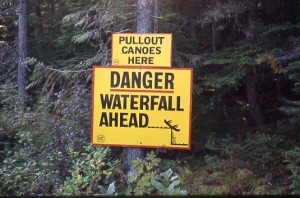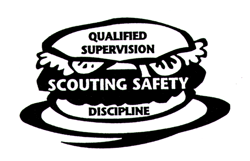The Volunteer Protection Act of 1997 immunizes from liability unpaid volunteers working for non-profit organizations whose negligence results in an injury to another during the course of their volunteer duties. This Act, of course, applies to adult Scout volunteers acting within the course of their volunteer duties.
An important exception in the Act to the stated immunity to liability is when such negligence constitutes “gross negligence”, as opposed to ordinary negligence, or the harm was caused by “willful or criminal misconduct, reckless misconduct, or a conscious, flagrant indifference to the rights or safety of the individual harmed by the volunteer.”
Under such circumstances, the Act’s immunity protections no longer exist. (BSA’s liability insurance for adult volunteers also does not cover injuries resulting from intentional or criminal acts).
But, what acts, or failure to act, constitute “gross negligence”, or “willful or criminal mis-conduct, gross negligence, reckless misconduct, or a conscious, flagrant indifference to the rights or safety of the individual harmed by the volunteer”?
The legal standards vary by state, and also in the eyes of the jury, who makes such a determination. But some real life stories may be instructive.

In a California case Chavez v. City of Santa Fe Springs, where a teen died from head injuries after having fallen from a falls during an unsupervised free time, an appeals court held that a jury might conclude that the actions of the supervising camp staff constituted gross negligence, stating as follows:
“The evidence is thus susceptible to the conclusion that the City failed to consider, or even to recognize, the risks that would potentially face the campers whose safety and well-being the City had undertaken to protect; that it failed to formulate any plan about how to meet and address those risks; and that it failed to implement the sorts of programs—using appropriate supervision, education, discussions, admonitions, or any other means—either to protect the campers from obvious dangers, or to enable them to recognize and guard against those dangers for themselves. From this a jury could find that the City was guilty of gross negligence.”

The Court relied on the following evidence in making such a conclusion:
- there was no requirement of adult supervision during excursions to areas of known danger that might be outside of the experience of city youth, such as running streams, slippery rocks, and waterfalls;
- there were no rules, warnings, admonitions not to approach—or even how to approach—these dangerous areas;
- there was no staff training or staff awareness with respect to such dangers;
- there was no education, advice, or discussion with the campers about these dangers; and
- there was no discussion of these dangers with the campers’ parents.
In another case, where a triathlete was injured upon being hit by a car while attempting to cross an un-monitored road intersection, despite existing triathlon standards requiring that road intersections be monitored for safety purposes, a court concluded that a jury might conclude that “a failure to heed any of the triathlon industry guidelines regarding intersections, which left oncoming drivers totally unaware of the possible dangers that awaited them, constitutes gross negligence.”
Are there “standards” against which an adult Scout volunteer’s actions might similarly be measured?
Of course there are!

The Guide to Safe Scouting describes in detail BSA’s policies and procedures (not to mention prohibited activities), as do the training modules Safe Swim Defense, Safety Afloat, Trek Safely, Weather Hazards, and Climb On Safely.
BSA’s Scouter Code of Conduct also requires adult volunteers to have knowledge of and follow youth protection rules, the Guide to Safe Scouting, and the BSA S.A.F.E. activity criteria (new 2020).
The Preface to the Guide to Safe Scouting states “activity planners should evaluate the risk or potential risk of harm, and respond with action plans based on common sense, community standards, the Scout motto, and safety policies and practices commonly prescribed for the activity by experienced providers and practitioners.”
As a result, a claim of ignorance of such “standards” by an adult volunteer may fall on deaf ears to be sure.

Adult Scout volunteers should thus be on notice that an injury that results from failure to comply with, or follow, or incorporate BSA‘s stated policies and procedures into, the planning and conduct of an outdoor activity, may result in an allegation of gross negligence, left in the hands of a jury to decide, based on the facts, with the potential loss of personal liability protection under the Act. (There is also the possibility, if the circumstances warrant, that the volunteer may be charged with criminal negligence)
But, more importantly, the fact that an injury may have resulted from such failure, together with the needless suffering to the victim, would be the real tragedy that might otherwise have been avoided.
A few reported cases deal with the issue of gross negligence in relation to Scouting incidents.
A 2016 Virginia case involving a supervising older Scout leading a non-swimmer younger Scout into the midst of a river on a submerged sandbar and leaving him there, from which he fell and later drowned, found that gross negligence was not involved on the part of the supervising Scout, as he returned and attempted to rescue the other Scout when he stepped off the sandbar into the water. Dissenting judges took a different view, saying the jury should decide. Interestingly, an allegation of gross negligence was initially made against the attending adult leaders, but this issue was not raised on appeal. In support of its decision, the appeals court defined “gross negligence” under Virginia law as being “a degree of negligence showing indifference to another and an utter disregard of prudence that amounts to a complete neglect of the safety of such other person.”

In 2015, a Virginia court found that the local council was not guilty of gross negligence in the providing of tainted hamburger meat to Scouts at its summer camp for use in foil dinners (resulting in a seriously sickened Scout suffering long-term disability due to the fact that he allegedly failed to properly cook his tainted meat). The council alleged that the Scouts had been provided cooking instructions for use in the cooking of the meal, which may not have been followed by the Scout, a fact relied on by the court. The troop also asserted that it routinely informed its Scouts of the importance of cooking food thoroughly, although it is unclear if such instructions were also made during the cooking of the foil dinner in question.
These two cases make clear that, if a claim of gross negligence, or willful or reckless misconduct, is being made, the end result forming the basis of the claim probably has tragic consequences!
And, it should be clear to all volunteers that failure to adhere to BSA guidelines and policies (such as failing to require the wearing of PFDs, ignoring weather warnings, ignoring elements of BSA S.A.F.E., ignoring aspects of Safety Afloat and Safe Swim Defense, to name but a few) may not only significantly increase the odds of a tragic outcome, but such failure may also provide cause for an allegation of “gross negligence”, or “willful or reckless misconduct”.
